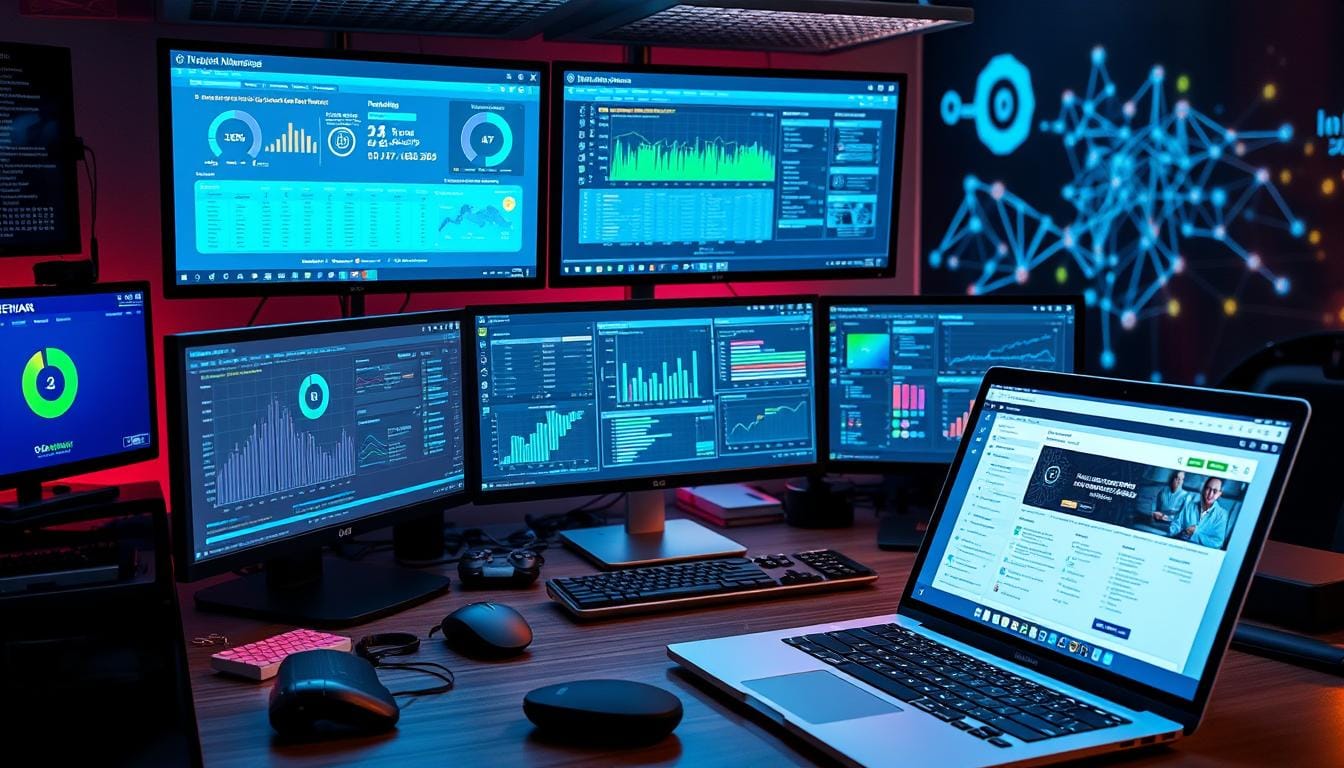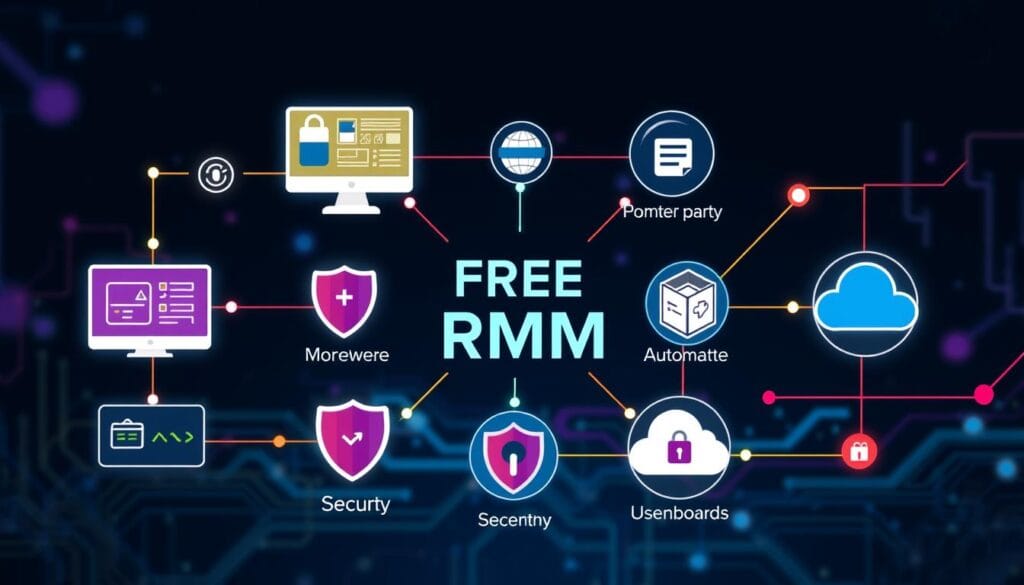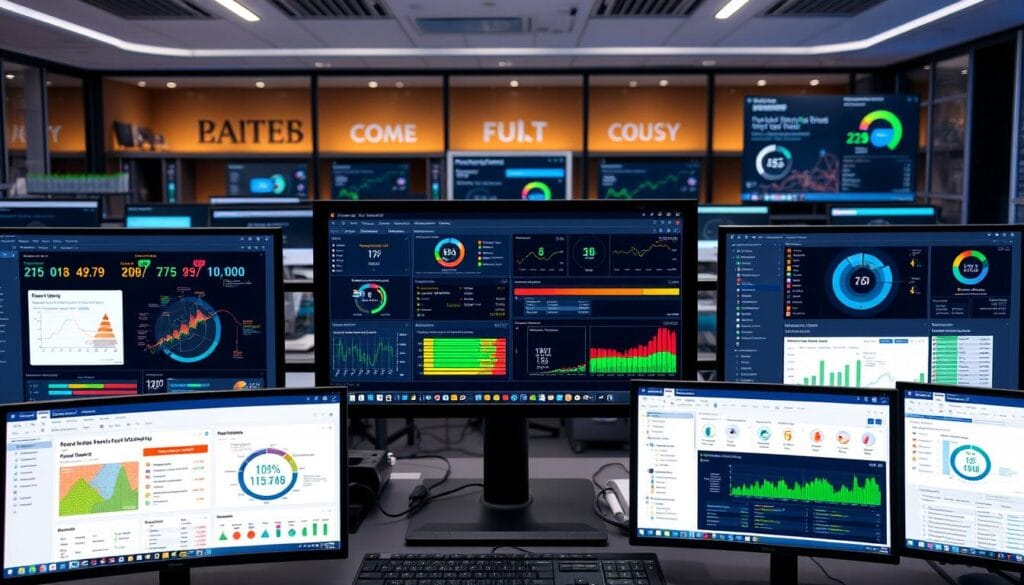
In today’s fast-paced digital world, businesses of all sizes need efficient IT management. Remote monitoring and management (RMM) software is key for IT pros. It lets them watch and manage networks, endpoints, and cloud services from one place. Many RMM solutions are pricey, but there are free and open source options too.
Free RMM tools are great for startups, small businesses, and those with tight IT budgets. They let IT teams watch and manage their IT setup, automate tasks, and keep systems secure and running well. There’s a free RMM tool for every business, whether you need cloud-based or on-premise solutions.
When picking a free RMM tool, think about your business size, IT setup, and what you need to manage. Popular free RMM tools include Nagios Core, Zabbix, Checkmk Raw, Icinga, LibreNMS, Netdata Community, and OpenNMS Horizon. These tools have features like network monitoring, endpoint management, patch management, and remote access.
Key Takeaways
- Free RMM tools provide a cost-effective solution for businesses with limited IT budgets
- Open source RMM software offers flexibility and customization options
- Cloud-based RMM solutions enable remote monitoring and management from anywhere
- On-premise RMM tools provide greater control over data and infrastructure
- Choosing the right free RMM tool depends on factors such as organization size, IT complexity, and specific management needs
Understanding Remote Monitoring and Management (RMM)
Remote Monitoring and Management (RMM) tools have changed how Managed Service Providers (MSPs) help their clients. These tools let MSPs watch and manage computers, networks, and systems from one place. This makes it easier for MSPs to work well with many clients at once.
RMM tools have cool features like watching systems in real-time, sending alerts, and fixing problems automatically. They also help MSPs keep software up to date and track how well systems are working. This way, MSPs can see everything they need to know about a client’s IT setup.
One big plus of RMM is that it can do routine tasks on its own. This means MSPs can focus more on helping clients instead of just fixing problems. This approach makes systems safer, cuts down on downtime, and makes MSPs more money.
RMM systems can be deployed through small software footprints and can be used to monitor and manage IT systems from anywhere, whether across the room or in another country.
Using RMM brings many benefits, like being able to watch and manage everything from one place. It makes support faster, automates tasks, and makes it easier to see how things are going. It also saves money by cutting down on travel and tool costs.
RMM tools are used in many fields, like tech, healthcare, and education. They help make support better, more reliable, and secure. For example, the City of North Adams saved a lot of money and time with NinjaOne’s RMM tool. Heritage Credit Union uses it to keep their assets safe from cyber threats.
As more people work from home, RMM tools are becoming even more important. The Cyber Defense Plan for RMM by CISA helps keep these tools safe from bad actors. RMM tools are key for MSPs and companies to manage their IT well.
The Benefits of Using Free RMM Tools
Free remote monitoring and management (RMM) tools are great for startups, small businesses, and MSPs. They offer a cost-effective way to manage IT infrastructure. This ensures it runs smoothly and securely. Free RMM tools also come with agentless RMM, making setup easier and reducing device load.
Cost Savings for Startups and Small Businesses
Free RMM tools save money, which is key for startups and small businesses. They can’t afford expensive RMM solutions. Free tools let them manage their IT without spending a lot. This way, they can use their resources for growth.
A small MSP saved a lot by switching to Syncro’s RMM. They also found a way to manage costs better. This allowed them to take on more work without overspending.
Scalability and Flexibility
Free RMM tools grow with your business. They’re flexible and work for different sizes and industries. As your IT needs change, these tools can too. They start small and grow with you, without big costs.
Tools like Level and Atera offer many features. They include real-time monitoring and automation. This meets the needs of MSPs, big companies, and small ones. They also support growing businesses and offer flexible pricing.
Using free RMM tools helps businesses use resources better. MSPs can manage more clients without visiting them. Automation in these tools makes routine tasks easier. This lets MSPs work more efficiently and serve more clients.
Key Features to Look for in Free RMM Software
Choosing a free RMM tool means finding one with the right features. These features help you manage your IT better and keep it safe and efficient. Here are the main things to look for in your no-cost RMM solution.
Remote Access and Troubleshooting
Remote desktop access is key in an RMM tool. It lets IT pros manage and fix devices from anywhere, without needing to be there. Make sure your RMM software has secure and reliable remote access. This way, you can fix problems fast and keep things running smoothly.
Paulo Gardini Miguel says RMM software should have remote troubleshooting. This means you can solve problems without needing to be there. Tools like Mesh Commander even let you access devices when they’re off, which is great for big areas.
Patch Management and Automation
Keeping systems up-to-date and secure is very important. Free RMM tools should have good patch management. This means they can find, download, and install updates for you. This saves time, reduces mistakes, and keeps your systems safe.
Automation is also key in RMM software. Tools like TacticalRMM have strong scripting engines. This lets you automate tasks, making your work flow better and giving your IT team more time for important tasks.
Asset Inventory and Reporting
Knowing what you have in your IT is crucial for good management. Free RMM platforms should let you track and manage all your devices and software. This is all from one place.
Customizable reports are very important for IT teams and customers. Look for RMM tools that let you make detailed reports. These reports can show you a lot about your IT, how it’s used, and how well it’s doing.
Also, think about RMM software with endpoint security, real-time monitoring, and alerts. These features help you find and fix problems before they get big. They keep your IT safe and sound.
Top Free RMM Tools
More people are working from home, with 32.6 million Americans expected to do so by 2025. This growth highlights the need for good remote monitoring and management (RMM) solutions. Luckily, there are many free RMM tools that offer quality management without costing a lot. These tools help businesses manage their remote teams well and keep operations running smoothly.
TacticalRMM: Open-Source Solution for Windows Environments
TacticalRMM is a free, open-source RMM tool for Windows. It has features like remote desktop access, patch management, and task automation. It’s perfect for businesses wanting to improve their IT management. With TacticalRMM, IT teams can keep their remote Windows devices running well and securely.
Mesh Commander: Remote Control and Management for Intel AMT
Mesh Commander is a free RMM tool for remote control and management, focusing on Intel AMT. It lets IT admins access and manage devices even when they’re off. This makes troubleshooting and maintenance easier. Mesh Commander’s advanced features are a big help for IT teams.
OpenNMS: Network Monitoring and Performance Management
OpenNMS is an open-source RMM tool for network monitoring and performance management. It finds and fixes issues before they become big problems. OpenNMS has detailed monitoring and customizable dashboards. It helps IT teams keep their networks stable and running smoothly.
Zabbix: Versatile Open-Source Monitoring Platform
Zabbix is a versatile open-source monitoring platform. It’s great for basic RMM tasks and more advanced monitoring. Its customizable dashboards and alerting make it easy for IT teams to manage remote devices. Zabbix is popular because of its wide range of features and scalability.
Spiceworks Network Monitor: User-Friendly Interface and Community Support
Spiceworks Network Monitor is known for its easy-to-use interface and strong monitoring features. It makes managing remote devices and networks simple. Plus, Spiceworks has a big community support network. Users can share knowledge, ask questions, and work together with other IT pros.
free rmm tools: A Closer Look at Different Models
When looking at cost-free RMM options, it’s key to know the different models. Each model has its own benefits and meets various needs. Let’s dive into the three main types: open-source solutions, freemium offerings, and free trials of paid software.
Open-Source RMM Tools
Open-source RMM tools, like TacticalRMM, let users see and change the code. This gives them control and flexibility. These tools also have active communities that help improve them. They’re a great choice for those wanting a cost-effective yet powerful RMM solution.
Freemium RMM Solutions
Freemium RMM tools offer a basic version for free, but with some limits. They let users try the software before paying. This is a good way for businesses to see if the software fits their needs without spending money upfront.
Free Trials of Paid RMM Software
Big names like Atera, NinjaOne, and SuperOps give free trials of their paid software. These trials let users try all features before buying. They’re great for comparing different RMM solutions and seeing if they fit with current IT systems.
Selecting the right free RMM tool depends on factors such as the organization’s size, technical expertise, and long-term goals. It’s crucial to carefully consider the features, scalability, and support offered by each model to ensure the chosen solution aligns with the company’s needs and budget.
Understanding the different free RMM tools helps businesses make smart choices. They can use these tools to improve IT management, work more efficiently, and save money.
When to Consider Upgrading to a Paid RMM Solution
As businesses grow, their IT needs change. Free remote monitoring and management software might not be enough. A paid RMM solution offers advanced features and benefits for growing organizations. Here are signs it’s time to invest in a premium RMM tool:
- Increased complexity: With more devices and users, free RMM tools can struggle. Paid solutions scale better and handle complex networks.
- Enhanced security requirements: Cyber threats are getting smarter. Businesses need strong security features like endpoint protection and threat detection. Paid RMM solutions offer these advanced security features.
- Need for integration: Paid RMM tools integrate well with other software like PSA systems and cloud platforms. This makes IT management smoother and more efficient.
- Dedicated support: Premium RMM providers offer dedicated support through phone, email, and chat. This is crucial for businesses that rely heavily on their IT and need quick help.
When thinking about upgrading to a paid RMM solution, look at pricing, features, and vendor reputation. Most charge per device, but other models like per-user or tiered might fit your budget better.
Investing in a paid RMM solution can provide the advanced features, scalability, and support needed to effectively manage and monitor a growing IT infrastructure.
The choice to upgrade to a paid RMM tool depends on your company’s specific needs and growth. By evaluating your IT needs now and in the future, you can decide if a premium tool is right for you. It ensures your IT runs smoothly, securely, and efficiently.
Integrating RMM with SaaS Spend Management: Octobits
More and more businesses use remote management platforms and network management software. They need a full IT infrastructure monitoring solution. Using a free RMM tool with Octobits SaaS spend management gives a complete view of your software. This helps you save money and improve security.
Comprehensive View of Your Software Ecosystem
Combining your RMM tool with Octobits lets you manage everything in one place. You can see and control your IT infrastructure, including servers and remote management platforms. Octobits works with big names like Microsoft 365, AWS, and Datto Autotask. This makes managing your IT easier and gives you insights into your spending.
Improved Security and Cost Reduction
Using RMM with Octobits boosts your IT management and security. It helps you spot and fix security issues fast. Octobits also helps you save money by finding unused software licenses. This way, you can make smart choices and cut costs.
Octobits offers free SaaS spend management software until December 2024, providing businesses an opportunity to manage SaaS licenses efficiently and economically.
Octobits’ free plan until December 2024 is a great chance for businesses. It lets them use RMM and SaaS spend management without extra costs. This is especially good for startups and small businesses with tight budgets. It helps them manage their IT well while keeping costs down.
Choosing the Right Free RMM Tool for Your Business
Choosing the best free remote monitoring management (RMM) tool for your business is key. You need to think about what your company needs most. This ensures the tool you pick fits your goals and supports your IT well.
Assessing Your Company’s Needs and Priorities
Start by figuring out what your company really needs. Think about what’s most important for your work, like advanced automation or strong security. Also, check if the tool is easy to use and can grow with your business.
When looking at your needs, consider these remote desktop management aspects:
- How many devices and users need support
- Where your remote team is located
- How complex your IT setup is
- What security and compliance rules you must follow
- What your budget is and if you might need more in the future
By looking at these points, you can find RMM tools that match your company’s needs.
Evaluating Vendor Reputation and Support
It’s also important to check the reputation and support of the RMM tool vendors. Look for vendors known for reliable remote access software. Read customer reviews and check industry rankings to see how other businesses like the tools.
Also, think about the support the vendor offers. A good support team can help a lot. Look for vendors with helpful documentation, training, and quick support to help you succeed with their tools.
Choosing the right free RMM tool is a big decision for your IT operations. By understanding your needs, checking vendor reputation, and looking at support, you can make a smart choice for your business.
Free RMM tools can be very helpful, but make sure they meet your needs. The right tool can make your operations smoother, increase productivity, and help your remote team do their best.
Conclusion
Free RMM tools and open source remote monitoring and management software are great for businesses. They help manage IT infrastructure without spending a lot. With over 50 RMM tools available, companies have many options.
When choosing, look at features like remote access, patch management, and asset inventory. This helps find the best free RMM solution for each business.
As businesses grow, they might need to upgrade to a paid RMM tool. This is to get more advanced features and support. Tools like NinjaOne offer top features and quick ROI.
Using RMM with SaaS spend management tools like Octobits can also help. It gives a full view of an organization’s software ecosystem.
Finding the right free RMM tool depends on a company’s needs. Assessing needs, checking vendor reputation, and looking at open source options are key. This way, businesses can manage their IT well and save money.










